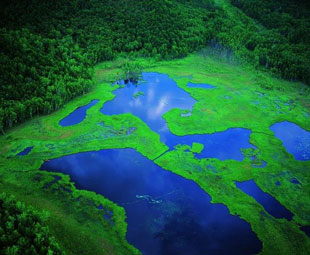700 leading experts meeting in Brazil urge policy makers to resist pressure to convert wetlands
Critical food shortages and growing demand for bio-fuels and hydro-electricity due to high fossil fuel prices rank among the greatest threats today to the preservation of precious wetlands worldwide as farmers and developers look for new areas for agriculture, energy crop plantations and hydro dams.

The wetland at the Daxinganling Nature Reserve, China
However, resisting pressures to convert wetlands is vital to avoid destroying ecosystems that provide a suite of services essential to humanity, including safe, steady local water supplies, preserving biodiversity and the large-scale capture and storage of climate warming greenhouse gases, according 700 leading world experts concluding a week-long meeting in Cuiaba, Brazil.
The experts issued the Cuiaba Declaration (appended) July 25, the final day of the 8th INTECOL International Wetlands Conference, convened on the northern edge of the world's largest tropical wetland, the Pantanal.
Wetlands include marshes, tidal marshes, peat bogs, swamps, river deltas, mangroves, tundra, lagoons and river floodplains. Among other services, they trap and store carbon in submerged organic matter, sustain biodiversity, and produce renewable natural resources, such as fish, natural pasture, timber, and wildlife. The statement stresses the rising value of wetlands in an increasingly urbanized world, especially such services as water storage and purification, and recreation.
Wetlands are under assault, however, due to agriculture, grazing, aquaculture, dams, waste disposal, invasive species and other problems caused by human activity.
"It is time to recognize the incalculable value of wetlands to all species – ours included," says conference co-chair Paulo Teixeira, Co-ordinator of the Cuiaba-based Pantanal Regional Environmental Programme, a joint effort of the United Nations University and Brazil's Federal University of Mato Grasso (UFMT), which hosted the event.
"If we don't plan and invest properly now, the cost to recreate artificially the services wetlands provide will dwarf the cost of preserving and protecting them in the first place."
In their statement, conference delegates from 28 nations lament "inadequate national development policies, lack of implementation of existing laws, and the lack of long-term land use planning that negatively affect wetlands on public and private property."